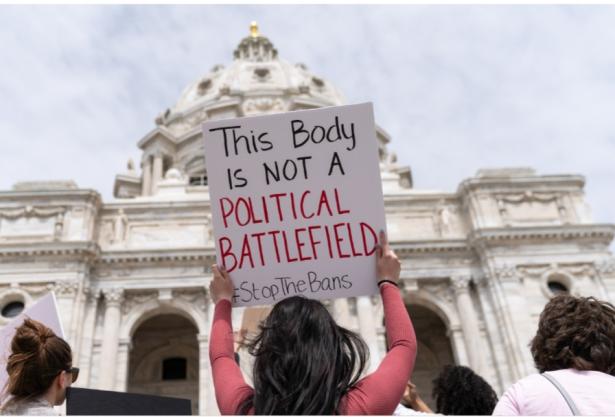More than 64,500 pregnancies have resulted from rape in the 14 states that banned abortion since Roe v. Wade was overturned, with the vast majority occurring in states that don't make exceptions for rape, researchers estimated today in a leading medical journal.
The big picture: The projection in JAMA Internal Medicine aims to shed light on the frequency of these pregnancies at a time when exceptions for rape loom large in abortion debates.
- Researchers, led by the medical director at Planned Parenthood of Montana, say even states with bans that have exceptions for rape impose other requirements that make it difficult to access the procedure.
- Rape victims have few options other than self-managed abortions, including by illegal methods or via pills obtained through the mail, or traveling out of state to where abortion is legal. As a result, many have to carry a pregnancy to term, the researchers wrote.
What they found: Using data from the Centers for Disease Control and Prevention, the Bureau of Justice Statistics and the FBI, researchers estimated that 519,981 rapes occurred in states with bans from July 2022 — in the immediate aftermath of Roe being overturned — through Jan. 1, 2024.
- Adjusting for the fraction of female victims ages 15 to 45 and the cases likely to result in a pregnancy, they projected 64,565 pregnancies resulted from rape during the four to 18 months various state bans were in effect.
- Nine out of 10 pregnancies were in states with no exceptions for rape victims, with 45% of those (26,313) in Texas. Missouri was next highest with 5,825.
- Idaho and Mississippi had the most pregnancies among the five states with exceptions for rape, with about 1,400 each.
Between the lines: The Supreme Court's decision to strike down federal protection of abortion threw regulation of the procedure to the states, some of which had "trigger bans" that immediately took effect. Others soon took up anti-abortion legislation.
- The researchers said there were 10 or fewer legal abortions a month in states with bans.
- Even those with exceptions for rape have other restrictions likely to disqualify victims, such as gestational limits or a requirement that the victim must report the rape to law enforcement.
Of note: The research contained a lot of statistical assumptions since sexual assaults are hard to measure accurately in surveys.
- The CDC and Bureau of Justice Statistics data don't include state-level data, so researchers turned to the FBI's most recent uniform crime reports, which include rapes reported to law enforcement in 2019.


Spread the word